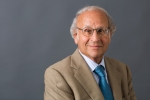Dr. Arthur S. Levine to Transition to New Role
High resolution image(s) available >
PITTSBURGH—After two decades of visionary leadership, Arthur S. Levine, MD, senior vice chancellor for the health sciences and John and Gertrude Petersen Dean of the University of Pittsburgh School of Medicine, has announced his intention to step down but, at the request of Chancellor Patrick Gallagher, will continue his leadership roles until his successor is hired. Levine will begin the transition process in the next few months by opening a new laboratory in the University’s Brain Institute, where he will pursue Alzheimer’s disease research.
“It’s difficult to overstate the remarkable impact that Art has had on the University of Pittsburgh, our School of Medicine, our health sciences programs, and UPMC,” says Gallagher. “His commitment to research and academic excellence is unparalleled and has fueled our University’s unprecedented rise as a leader in leveraging knowledge for society’s gain.”
Levine has initiated new mechanisms designed to enhance the recruitment and retention of talented students and trainees, with the goal of helping to reverse the precipitous decline across the nation in the numbers of young physicians and other health science students embarking upon substantive careers in research and education. A key manifestation of this commitment to research can be seen in the Longitudinal Research Project, a Levine-authored curriculum change that requires all Pitt medical students to complete a mentored, independent research assignment over the course of their education. Now a national best practice, the Longitudinal Research Project aims to connect budding clinicians with career opportunities in the fields of education and research.
Levine has also initiated curriculum changes that focus on the human side of medicine, including the Longitudinal Alliance Project, through which a student may choose to be paired with a patient who has a moderately complex condition. The students maintain these relationships throughout the course of medical school.
As dean, Levine oversees 31 academic departments, having named all but three of the current department chairs. His foresight led to the establishment of the nation’s first Department of Critical Care Medicine in 2002, a new Department of Immunology in the same year, as well as the Department of Computational and Systems Biology (2004), the Department of Structural Biology (2005), the Department of Biomedical Informatics (2006) and the Department of Developmental Biology (2009), among others. He addressed the need for strategic, focused and multidisciplinary approaches to research in emerging fields of medicine by establishing the Drug Discovery Institute (2005), the Center for Vaccine Research (2007), the Center for Military Medicine Research (2012), the Institute for Precision Medicine (2013) and the Brain Institute (2014).
He also played key roles in building the medical school’s presence on the world stage. In 2011, the School of Medicine entered into a unique collaboration with Tsinghua University in Beijing (the “MIT of China”) to bring Chinese medical students to Pitt for biomedical research training. A year later, the Republic of Kazakhstan’s Nazarbayev University, founded in 2010, selected the School of Medicine to guide the establishment of its own U.S.-style medical school, which opened in 2015 and will graduate its inaugural MD class in spring 2019.
Beyond his University responsibilities, Levine works closely with UPMC (University of Pittsburgh Medical Center), one of the largest academic medical centers in the United States, to ensure that health care delivery, biomedical research and education, the three legs of the “classic academic stool,” remain equally strong and well positioned for future growth. A fourth “leg,” entrepreneurship, led Levine to provide institutional resources in support of the establishment of the Clinical and Translational Science Institute, which is charged with helping researchers bring innovation from bench to bedside, and to create the position of assistant vice chancellor for health sciences translation.
Since coming to Pitt in 1998, Levine, a professor of medicine and molecular genetics, until recently, maintained an active research laboratory focused on the molecular mechanisms of DNA damage and repair and will soon open his new lab to investigate Alzheimer’s disease. He has authored or co-authored more than 250 research papers and has chaired numerous scientific meetings and advisory boards, as well as served on editorial boards for scientific and medical journals.
Levine received the Meritorious Service and the Distinguished Service Medals of the U.S. Public Health Service, the Surgeon General’s Exemplary Service Medal, the NIH Director’s Award, and the Distinguished Alumnus Award and an Honorary Doctor of Humane Letters degree from the Rosalind Franklin University of Medicine and Science, also known as the Chicago Medical School, from which he received his medical degree in 1964. During his tenure, Pitt’s medical school has stayed among the top 10 academic centers for research funding from the National Institutes of Health.
After an internship and residency in pediatrics at the University of Minnesota Hospitals in Minneapolis, Levine completed fellowship training in hematology and biochemical genetics at the University of Minnesota. He joined the National Cancer Institute in 1967 and later became scientific director of the NIH’s National Institute of Child Health and Human Development from 1982 to 1998.
# # #
Media Resources
Schools of the Health Sciences Media Relations
For more information about Pitt's schools of dental medicine, health and rehabilitation sciences, medicine, nursing, pharmacy, and public health, click here >
To locate stories from health science schools prior to 2013, visit the UPMC news archives »
Urgent Question?
University of Pittsburgh news reps are available to answer urgent media inquiries. Outside of regular business hours (Mon-Fri, 8:30 a.m.-5 p.m.), please email us at media@pitt.edu.
News reps for University of Pittsburgh Health Sciences schools can be reached outside of regular business hours through the paging operator at 1+412-647-2345.



